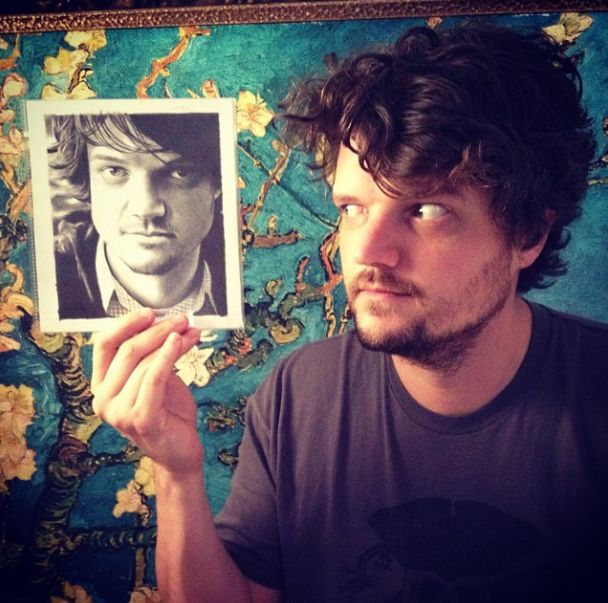
Poetry Corner: A Blade Of Grass - New Palestinian Poetry. Poems celebrating a culture of resistance and solidarity - read by the poets and in translation, and by advocates for justice. An anthology of works by poets from the Occupation, from imprisonment, bombardment, internal exile in Israel, and the Palestinian diaspora. And including a poem in memory of Razan Al-Najar, the 21 year old Palestinian nurse murdered by an Israeli sniper while tending to wouned protesters during the March Of Return. Chris Butters reports.
** "I think certainly the way that my mother parented, reflected that I think she made sure she was a thousand percent present in our lives."

Letters From A Young Father: A Conversation With Edoardo Ponti. The filmmaker and now poet phones in to share thoughts about how his mother Sophia Loren has informed and inspired his poetry. And what the screen legend imparted to him, along with his father, the late eminent filmmaker Carlo Ponti, to face the challenges of his own journey to parenthood - through his venture into poetry with this book. Ponti also recounts how Sophia Loren is one of the very few actresses playing working class women on screen who actually came from a life of brutal poverty herself - and not just an actor impersonating the working class. Ponti will also read from his work.
** "I think it's a scary time, when belief systems can dictate whether or not content is deemed safe or not. And in this particular case, where we are spreading knowledge and information - it scares me, and sends a very clear message that we are living in an era of censorship."Cyberspace Corner: Green Flower Media - what is it all about, and what does it have to do with cannabis knowledge. Green Flower Media head Max Simon is on the line to explain how his video platform created by doctors, researchers and scientists, delivers that knowledge around the globe to normalize the conversation about marijuana. Along with what's up with a Youtube censorship shutdown known as 'cannabis cleansing' against his organization. Plus, his take on both the inteference and signs of moving in to take over the progressively legalized cannabis industry by the alcohol and pharmaceutical corporations - and his thoughts about the mass incarceration for life of those convicted of drug charges.

** "If a character is a moron and has a weird name, I'll probably get the job - but I feel like I play stupid with a certain joyfulness."
Matt Jones Talks Breaking Bad: And one of those unusual roles as Badger, in this small screen cult classic, meth fueled suburban noir playing out in the New Mexico desert. In a kind of generation gap, economic hard times vocational switchup of Bryan Cranston from teacher to underground meth manufacturer, to initially make middle class ends meet. Jones also delves into the mysterious phenomenal success of Breaking Bad that remains an online streaming sensation after all these years - and the collection of strange characters filling his dramatic dossier, exemplifying "the crazy stuff that has become the collage of my life."
Arts Express: Dare To Be Different Radio
THE KING MOVE REVIEW - OR RATHER A TALE OF TWO CONS
A documentary about Elvis Presley that could have benefited from both a less worshipful title and portrayal, The King is likewise compromised by a facade of even handedness that displays more of a bid to play both sides of a divided nation. In other words, tossing in occasional black resentment of how their music has long been ripped off by white entertainment interlopers, while heavy handedly hammering away with a dubious notion of tossing together Elvie with the equally fraudulent American Dream, to mainstream this project enough for white Middle American acceptance.
Glorifying the mid-20th century rock 'n roll star as victim rather than ripoff artist of black music, director Eugene Jarecki opts for explanation as a US music industry bid to exploit Elvis as a lucrative investment product. Which is not to say that development likewise factored in, but the reality as opposed to this bio-doc puff piece was a case of Presley's ambition-driven Faustian bargaining, rather than his befuddled innocence displayed on screen.
Though equally offensive is the filmmaker secondarily propping up this entertainment industry human prop, as synonymous with the American Dream. In other words, whose dream? Certainly not counting the simultaneous horrendous US history back then of Jim Crow - and McCarthyism's oppression of the US Left, driving many victims to suicide and exile. While the emerging prosperity of the time used to justify the notion of the American Dream, was actually a result of this country enriching itself from rebuilding the damage of Western Europe endured from World War II through the Marshall Plan - and which has become the US imperialist blueprint for profiteering from wars and lucrative reconstruction ever since.
So with spotty storytelling that both scratches surfaces and serves as an audience head scratcher, what seems to be especially missing is a revisitng of the life and music of Elvis that could have been substantially enhanced by a noir approach. Say for instance, an in depth examination of culture clash with the oppositional musical emergence of the Beatles, or delving into the performer's spiritual desert epiphany when beholding a vision of Stalin in the clouds, that is tossed in without explanation.
Or equally a mystery begging for much more when mentioning his devious manager Colonel Tom Barker as the reason Elvis couldn't travel abroad because Barker couldn't apply for a passport - when he was actually an illegal Dutch immigrant possibly wanted for murder back home. And the subject of far more intriguing films in his own right, including his depiction by Pat Hingle in John Carpenter's Elvis, and elsewhere by Beau Bridges, Randy Quaid, Hugh Gillin, Gene Jones and Billy Gardel.
Prairie Miller
